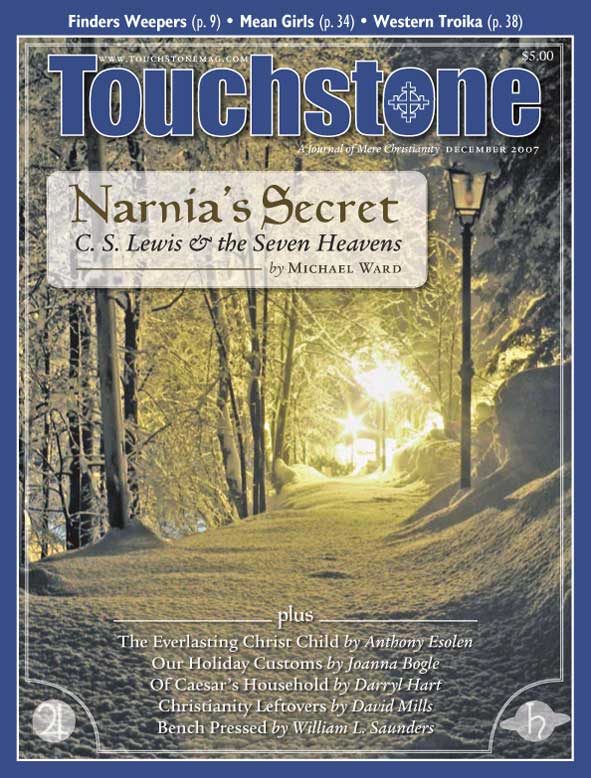Leftovers
Christianity for the Rest of Us: How the Neighborhood Church Is Transforming
the Faith
by Diana Butler Bass
HarperSanFrancisco, 2006
(321 pages, $23.95, hardcover)
reviewed by David Mills
Mainline Christianity in the middle twentieth century became an “establishment religion” that “traded open questions for easy answers—their own,” writes the Episcopal historian Diana Butler Bass in Christianity for the Rest of Us. By the 1960s it had become “self-absorbed and secular.” Liberals had “lost their sense of wonder, transcendence, and passion,” and this helps explain the success of the conservative Protestant response.
She proposes an alternative, “something happening in the pews . . . that could transform American Christianity.” Judging from the blurbs on the cover, mainline leaders from the archbishop of Canterbury to Jim Wallis to Marcus Borg seem to have read the book with relief.
A Village Answer
Diana (the author is the godmother of our second child, and though we have since gone in different directions, we remain friends) spent three years, funded by the Pew Foundation, traveling the country studying mainline churches “that have found new life in the face of change.”
She proposes a new “village church” that provides “a spiritual community, a home, where they [its members] could forge new, non-biological family ties with a religious tradition.” It holds to the tradition in ways the old mainline liberalism did not, but unlike conservatism uses it “in ways that are open, fluid, flexible, and dynamic.”
This “emerging” or “transformative” mainline Christianity “is open and generous, intellectual and emotive, beautiful and just . . . creative and traditional, risk-taking and grounded, confident and humble, open and orthodox.” It “emphasizes open practice instead of purity.” It descends from “ancient wisdom,” is an “old kind of Christianity.”
These Christians “rest comfortably with ambiguity” and “resist dogmatism in favor of being part of a community where they can ask life’s questions.” For them, “thinking theologically did not mean arriving at certain conclusions” (she means “certain” in both senses, particular and definite).
These are oft-repeated themes, and nowhere in the book does she define this kind of Christianity any more concretely or lay out its doctrinal and moral foundation. She is clear, however, about what it is not.
It is not the religion of those “who build churches to protect people from change,” who “venture out into the world to try and force the rest of us back to the perfect world of their fathers,” who “prefer to build walled villages and do not want to see.” It is not “exclusivist Christianity,” which promotes “a political agenda . . . from the religious right.” What I would call traditional Christianity is never once described in a complimentary or respectful way.
David Mills has been editor of Touchstone and executive editor of First Things.
bulk subscriptions
Order Touchstone subscriptions in bulk and save $10 per sub! Each subscription includes 6 issues of Touchstone plus full online access to touchstonemag.com—including archives, videos, and pdf downloads of recent issues for only $29.95 each! Great for churches or study groups.
Transactions will be processed on a secure server.
more from the online archives
calling all readers
Please Donate
"There are magazines worth reading but few worth saving . . . Touchstone is just such a magazine."
—Alice von Hildebrand
"Here we do not concede one square millimeter of territory to falsehood, folly, contemporary sentimentality, or fashion. We speak the truth, and let God be our judge. . . . Touchstone is the one committedly Christian conservative journal."
—Anthony Esolen, Touchstone senior editor











